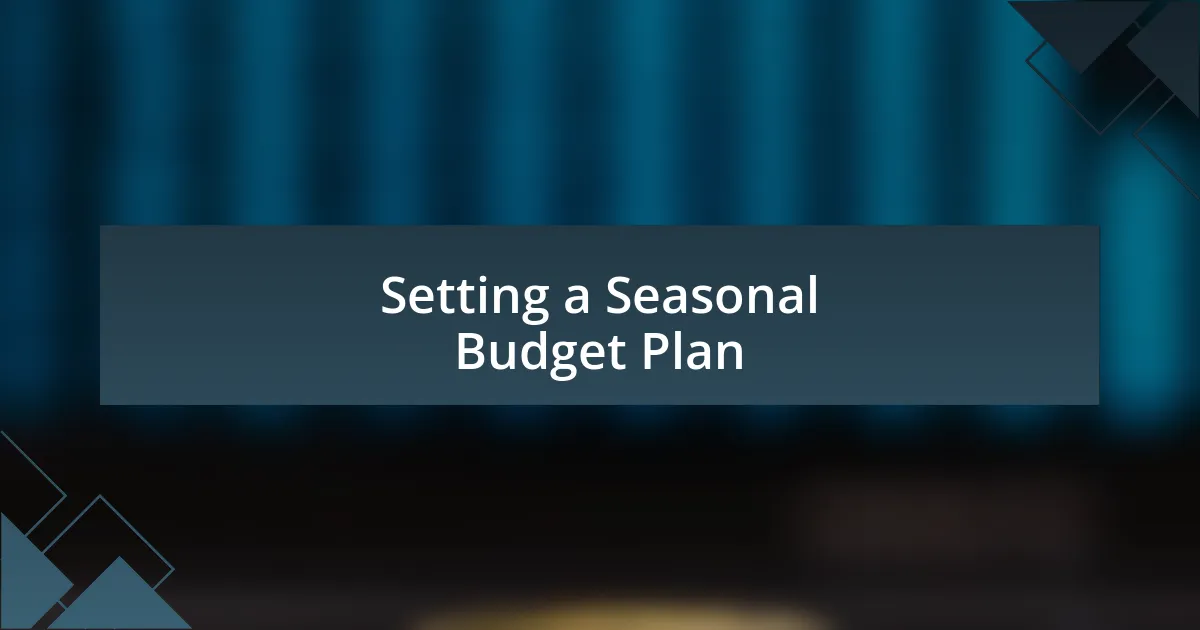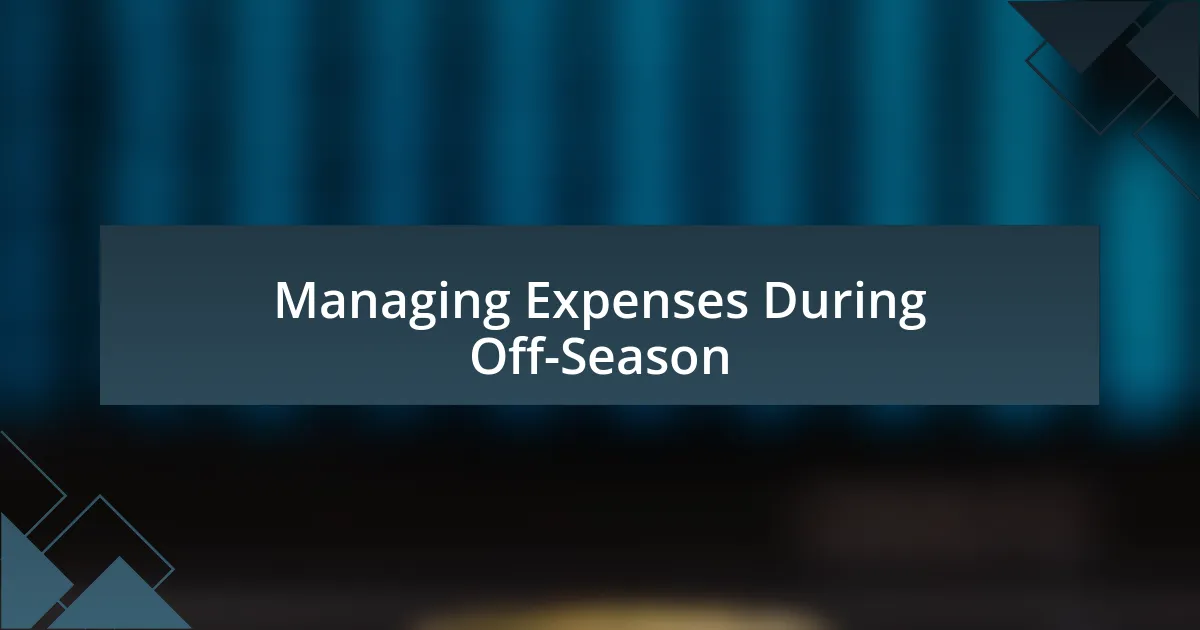Key takeaways:
- Understanding seasonal spending patterns helps manage finances effectively and avoid impulsive purchases.
- Creating a seasonal budget plan allows for better allocation of funds and tracking of expenses to reduce financial stress.
- Utilizing discounts, sales, and loyalty programs can maximize savings during shopping seasons.
- Regularly tracking spending and adjusting budgets promotes financial awareness and flexibility for future expenses.

Understanding Seasonal Spending Patterns
Seasonal spending patterns are fascinating because they reflect how our moods and societal events influence our purchasing choices. I remember noticing during the holiday season how my excitement for gifts often led to impulsive buys. Have you ever found yourself in a similar situation, feeling the pressure to splurge?
In spring, I tend to feel energized, prompting me to invest in home improvement or outdoor activities. I’ve often wondered why a simple change in the season can ignite such a strong desire to redecorate or refresh my garden. It’s a refreshing reminder that our environments can significantly impact our spending habits and priorities.
As summer rolls in, I often experience the urge to travel or enjoy leisure activities. The warmth and longer days make me crave experiences that can easily lead to unplanned expenditures. Do you find yourself budgeting differently during this season, perhaps planning vacations or summer events that stir a sense of adventure? Understanding these patterns can help us manage our finances more effectively, allowing us to enjoy the experiences we crave while staying grounded in our budgets.

Setting a Seasonal Budget Plan
Setting a Seasonal Budget Plan
Creating a seasonal budget plan can be a game-changer in managing your finances. When I first started this practice, I found that allocating specific amounts for each season helped me avoid those tempting splurges. For example, I set aside a little more for summer travel, allowing me to explore new places without the stress of overspending.
I also discovered the importance of tracking seasonal expenses; it’s amazing how small costs can add up. Last winter, I underestimated my spending on holiday decorations and gifts. This year, I created a detailed list of anticipated expenses, which not only made my budget more efficient but also reduced my seasonal stress. Wouldn’t it be great to enjoy the holidays without fretting about finances?
Lastly, consider adjusting your budget based on your priorities for each season. For instance, I’ve noticed I often desire more leisure activities in the spring, so I focus my spending there, while dialing back on my winter expenses. This method ensures that I can embrace each season’s unique experiences while keeping my financial health intact.
| Season | Budget Allocation |
|---|---|
| Winter | Gifts and Celebrations |
| Spring | Home Projects and Activities |
| Summer | Travel and Leisure |
| Fall | Back-to-School and Holidays |

Strategies for Smart Holiday Spending
Finding ways to spend wisely during the holidays can truly transform your experience. In past years, I’ve navigated the chaos of holiday shopping with a clear plan in mind, and I can honestly say it made a world of difference. By prioritizing gifts and making a list, I’ve avoided those last-minute impulse purchases that always seem to sneak up on me.
Here are some strategies I’ve found effective for smart holiday spending:
- Create a Gift List: Jot down who you need to shop for and what you plan to buy. This not only keeps you organized but also helps limit unplanned expenses.
- Set Spending Limits: Determine how much you can afford to spend on each person. Sticking to these limits can reduce the temptation to overspend.
- Prioritize Experiences: Sometimes, instead of physical gifts, I opt for experiences like concerts or workshops. These create lasting memories without the physical clutter.
- Shop Sales and Use Coupons: Throughout the year, I’ve learned to keep an eye out for sales and collect coupons, ensuring that my holiday shopping doesn’t break the bank.
- Consider Handmade Gifts: I’ve discovered that crafting something special can be more meaningful than store-bought gifts. It adds a personal touch and saves money, too.
Embracing these strategies has not only eased financial anxiety but also allowed me to focus on what truly matters—the joy of giving and celebrating with loved ones.

Managing Expenses During Off-Season
Managing expenses during the off-season can be a game changer. I remember a time when I took advantage of post-holiday sales to stock up on gifts for the next year. It was surprising how much I saved; buying items at a fraction of their original price gave me such satisfaction, and I felt well-prepared ahead of the next holiday rush.
Another tactic that has worked for me is to review and adjust my budget. After the holiday season, I like to take a step back and analyze where my money went. This reflection helps me identify spending patterns and allows me to allocate funds more wisely for the future. Have you ever found areas where you could cut back? I certainly have, and it has made the following season easier to manage financially.
Lastly, I think about embracing off-season activities that are budget-friendly. For instance, exploring local arts and crafts fairs during quieter months provides unique gifting options that won’t strain my wallet. Viewing these moments as opportunities rather than restrictions has shifted my mindset. What about you—how do you approach off-season spending? It’s about finding joy in savings, and that attitude makes all the difference.

Using Discounts and Promotions Effectively
Using discounts and promotions effectively can transform the way we approach spending during seasonal sales. I still remember the thrill of finding a 50% off coupon for a kitchen appliance I had been eyeing. Suddenly, that hefty price tag felt achievable, and making the purchase not only saved me money but also gave me the sense of victory that comes from scoring a great deal. Have you ever experienced that rush of excitement when shopping? It’s the little moments like these that can turn what could be a financial burden into a wise investment.
Moreover, I always keep an eye on seasonal sales calendars. Knowing when major discounts will occur allows me to plan my purchases ahead of time. For example, I tend to stockpile summer apparel during late fall when retailers clear their inventory, and I often find high-quality items at minimal prices. It’s almost like a treasure hunt—waiting in anticipation and then pouncing on those amazing deals. Don’t you love it when you can stretch your budget further?
Lastly, I think it’s essential to combine discounts with loyalty programs. I recall signing up for a store’s loyalty program and gaining access to exclusive promotions that weren’t available to non-members. The small effort of registering led to significant savings over time, reinforcing my belief that savvy shopping can be both strategic and rewarding. What are some loyalty programs you’ve found beneficial? It’s all about making your money work for you, and being proactive with discounts is a gateway to mastering seasonal spending.

Tracking Spending and Adjusting Flexibly
Keep in mind that tracking spending isn’t just about keeping a tally; it’s about understanding your patterns and motivations. I vividly remember the first time I reviewed my monthly expenses closely. It felt like shining a spotlight on my financial habits—seeing exactly where my money was going made me reconsider impulse buys. Have you ever paused to analyze your spending? That moment of realization can be a game-changer.
Additionally, I find that using budgeting apps helps maintain flexibility in my seasonal spending. These tools allow me to set aside funds specifically for those times when the impulse to splurge might hit hard, like holiday sales or back-to-school shopping. I recall setting an adjustable limit while stocking up on decorations for the fall season, which helped me enjoy the festivities without the stress of overspending. How do you manage your budget when the seasons change? Finding a strategy that suits your lifestyle can make all the difference.
Ultimately, adjusting my spending strategy based on what I track enables me to stay aligned with my financial goals. There’s something empowering about being able to pivot when necessary; knowing I can pull back from non-essential items during a high-spending month gives me peace of mind. I particularly cherish those moments when I realize I can treat myself guilt-free because I’ve been diligent in my tracking. Isn’t it rewarding to enjoy the fruits of our budgeting efforts?











